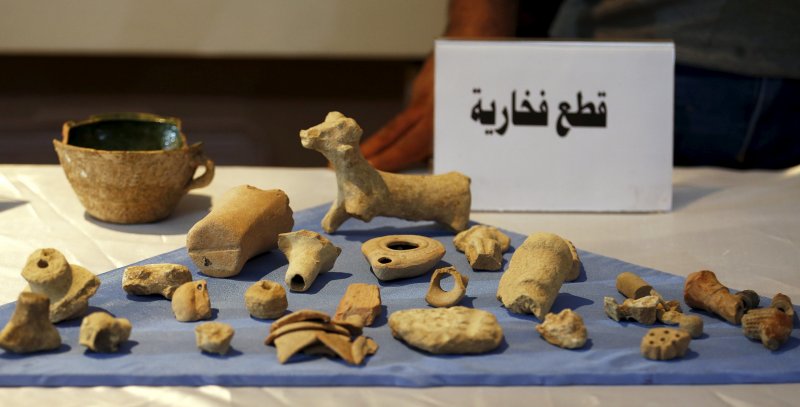March 31, 2016. The Antiquities Coalition has created a “#CultureUnderThreat Task Force Report,” to be launched mid-April. A draft of the Proposed Solutions outlined in this report was circulated in February, asking for comments on approximately 40 recommendations contained in the draft report.
Regrettably, while some suggestions are meritorious, and would direct US military and diplomatic attention to preventing cultural damage and preserving cultural heritage intact, the report’s chief purpose appears to be to create a sense of crisis (using highly inflated claims about the trade in looted art) that will prompt draconian trade restrictions.
The report focuses primarily on US actions outside of the regions of conflict, calling for everyone from the National Security Council to the Peace Corps to become culture cops.
The report deliberately avoids discussing the failure of source countries to give more than lip service to domestic cultural needs. It does not mention policing sites or cracking down on insider theft and neglect and corruption. According to this Task Force Report, the only governmental organizations without any responsibility for cultural heritage are those in source countries.
As the email accompanying the draft states, “On the note of source countries, we are in complete agreement that the illicit trade must be attacked from all ends, confronting both supply and demand. However, for the purposes of this report, which again is US geared, we felt that we could not give justice to recommendations for source countries. We hope that a future report will tackle this important question.”
Finally, the report relies on debunked data, discredited reports, and phony “facts” about the volume and value of a supposed multi billion dollar trade in antiquities as justification for what amounts to a repression and criminalization of the art market.
Alternative Solutions NOT Discussed in the Report
This is not a reasoned approach to reducing looting and unlawful trade.
Alternative approaches to the Antiquities Coalition’s Task Force Report are to beef up security at Syria’s borders and dramatically increase enforcement in neighboring countries. Such actions would send the most direct message to discourage people who would profit from archeological depredation.
As a former high ranking Customs official, James McAndrew, has stated, the most effective work ever done to halt looting in Iraq was through cooperative engagement between US law enforcement and cultural officials and law enforcement in the countries neighboring Iraq.
The international art trade is very concerned. Events have shown that art dealers and collectors agree with archeologists that Syrian heritage should be preserved in situ. The trade has demonstrated not only due diligence but also a determination not even to take a chance on buying anything looted. Museums, collectors, and the trade can be helped in this area by law enforcement agencies promptly providing information on known looted objects to the public. Stopping looting is truly an arena in which all of these parties’ interests are aligned.
Current technology could not only help to track stolen objects but also to enable a lawful, global, trackable trade, with artifacts being registered with photos and digital tracking numbers. The trade has expressed interest in the past in developing a workable system for enabling claims and for giving repose to artworks long out of the ground.
Note: The Task Force Report proposes using a tracking system for antiquities such as the one used for authenticating diamonds as lawfully dug – without mentioning that source countries are not willing to authorize any export of antiquities whatsoever.
A key concern is to stop the press frenzy and hyperbole about billion dollar markets, which encourages poor and displaced people in the region to take up looting. Rather, all concerned should stress the fact that art dealers and collectors and archeologists are in agreement that looted materials should not be bought or sold and that archaeological sites should be protected. Law enforcement should make public the information on known looted objects in order to assist museums, collectors, auction houses and the trade in doing due diligence.
The Antiquities Coalition’s “CultureUnderThreat Task Force Report”‘ questionable proposals include:
- The United States should immediately and fully implement United Nations Security Council Resolutions 2199 and 2253 on cutting off terrorist financing from antiquities trafficking.
- When required to cut off key sources of terrorist financing, the President should prohibit the import of illicit antiquities through executive order.
- The National Security Council (NSC) should take the lead in coordinating and developing United States government policy in the fight against antiquities trafficking and terrorist financing
- The United States Senate should pass the Protect and Preserve International Cultural Property Act (H.R. 1493/S. 1887).
- Congress should provide the budget, staff, training, and other resources needed to adequately conduct criminal investigations and prosecutions of cultural property crimes.
- Penalties for criminal convictions of cultural property crimes should be increased.
- Financial thresholds for prosecuting cultural property crimes should be lowered.
- Training for civil affairs — both active duty and reservists — at Fort Bragg should provide a general background in cultural property protection, in addition to including antiquities trafficking as part of the existing military training programs on counter threat finance.
- The United States should support the newly announced United Nations–Italy Task Force for Culture with expertise, funding, and other resources.
- Law enforcement should shift its focus from seizure and repatriation to the dismantling of criminal networks through criminal prosecution.
- The Department of Justice (DOJ) should appoint designated prosecutors to bring criminal cases against individuals and organizations involved in the illicit antiquities trade, modeled on units who prosecute wildlife trafficking for its Environmental Crimes Section (ECS).
- The State Department should proactively solicit bilateral agreements with other states, as provided for by the 1970 UNESCO Convention and the U.S. Convention on Cultural Property Implementation Act.
- S. Customs and Border Protection (CBP) should work with the World Customs Organization (WCO) to join and further develop ARCHEO, a web based application that allows real time communication between government authorities and international experts to prevent antiquities trafficking
- S. Customs and Border Protection (CBP) should work with the World Customs Organization (WCO) to join and further develop ARCHEO, a web based application that allows real time communication between government authorities and international experts to prevent antiquities trafficking
- The Internal Revenue Service should prioritize investigating tax fraud for art and antiquities donations, and additionally require proof of due diligence and valid provenance for any deduction, to be included in the mandatory written appraisal, along with information on the object’s authenticity, physical condition, etc.
- The international community should create a certification scheme for antiquities like the “Kimberley Process,” taking into account lessons learned from the trade in “conflict diamonds.”
- We propose that during this time of unprecedented crisis, art market players will voluntarily pledge to be fully transparent in their dealings, making publicly available provenance information and proof of due diligence for any antiquities. Institutions like museums that receive public funding should go even further, maintaining a disclosure policy for this information that follows the spirit of the Freedom of Information Act (FOIA).
- Because incidents of looting most often remain undiscovered until the objects surface on the market, and thus no records of their theft exist, we call upon stolen art databases to cease certifying antiquities.
- A campaign against “conflict antiquities” is needed to discourage the purchase of looted antiquities.
- The ICOM International Observatory on Illicit Traffic in Cultural Goods, or another appropriate institution, should develop a central repository for crowdsourced data about cultural looting and destruction. (Note: but not available to the public)
 Treasures returned to Iraq by the US. Courtesy Homeland Security Investigations.
Treasures returned to Iraq by the US. Courtesy Homeland Security Investigations. 

